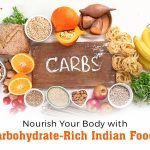In recent years, there has been a growing awareness of the importance of incorporating protein-rich foods into our diets, particularly among individuals following vegetarian lifestyles.
This awareness is especially prevalent in the context of Indian cuisine, which offers a rich tapestry of plant-based options that are not only delicious but also packed with nutrients.
Indian cuisine is renowned for its diverse vegetarian dishes, many of which are naturally high in protein. From lentils and chickpeas to paneer and tofu, there are countless options available for those looking to increase their protein intake without consuming meat.
These protein-rich ingredients are the foundation for a wide range of traditional Indian dishes, from hearty curries to savory snacks.
Optimal health and well-being are fundamental aspects of a fulfilling life, and nutrition plays a central role in achieving and maintaining these goals.
A balanced diet with adequate protein is essential for supporting various bodily functions, including muscle repair and growth, immune function, and hormone regulation.
Ensuring sufficient protein intake can sometimes be a concern for individuals following a vegetarian diet. However, with the abundance of protein-rich options available in Indian cuisine, it is entirely possible to meet one’s nutritional needs while enjoying a diverse and flavorful diet.
By incorporating a variety of plant-based protein sources into their meals, individuals can not only support their overall health but also experience the culinary delights that Indian cuisine has to offer. Let’s explore some of the key protein-rich ingredients commonly used in Indian cooking and delve into the nutritional benefits they provide.
Protein-Rich Vegetarian Sources In Indian Cuisine
Choosing protein-rich vegetarian options offers numerous benefits. Firstly, it promotes better weight management by increasing satiety and supporting muscle mass.
Secondly, it lowers the risk of chronic diseases like heart disease and diabetes while improving overall heart health. Thirdly, it contributes to environmental sustainability by reducing greenhouse gas emissions and preserving natural resources.
Lastly, it aligns with ethical and compassionate values by reducing animal suffering. Overall, opting for protein-rich vegetarian options enhances personal health and supports a more sustainable and humane lifestyle. Here are some ideal options for your diet.
01 Lentils
Lentils, known as “dals” in Indian cuisine, including arhar (split pigeon peas), urad (black gram), moong (green gram), and masoor (red lentils), are prized for their protein richness.
They are excellent plant-based protein sources, with protein content ranging from 18-25% of their total calories. Lentils are rich in fibre, vitamins, and minerals, such as iron, folate, and potassium. Their low glycemic index aids blood sugar regulation, making them suitable for individuals with diabetes. Incorporating lentils into meals provides a nutritious boost.
02 Legumes
Legumes like chickpeas (chana), kidney beans (rajma), and black beans are notable for their protein richness and nutritional value. Chickpeas contain approximately 19 grams of protein per cooked cup, while kidney beans and black beans offer around 15 grams each.
Beyond protein, they are fibre-rich, aiding digestion and promoting satiety. These legumes are also abundant in essential nutrients like iron, magnesium, and folate, crucial for various bodily functions. Their versatility allows for the creation of diverse dishes, from hearty stews to flavorful salads, making them valuable additions to a balanced diet that prioritizes protein intake.
03 Nuts
Nuts like almonds, peanuts, and cashews are renowned for their protein richness and nutritional value. Almonds, for instance, provide about 6 grams of protein per ounce, while peanuts offer approximately 7 grams and cashews around 5 grams.
Beyond protein, they are packed with healthy fats, fiber, and essential vitamins and minerals like vitamin E, magnesium, and zinc. These nutrients support heart health, brain function, and immune system strength. Additionally, nuts contain antioxidants that help combat inflammation and oxidative stress in the body. Incorporating a variety of nuts into the diet offers a delicious and nutrient-dense way to boost protein intake and overall wellness.
04 Seeds
Seeds like chia, pumpkin, and flax are prized for their protein richness and nutritional value. Chia seeds contain about 5 grams of protein per ounce, while pumpkin seeds offer approximately 9 grams and flax seeds around 6 grams.
In addition to protein, these seeds are rich in omega-3 fatty acids, fiber, and various vitamins and minerals such as magnesium, calcium, and iron.
They also boast antioxidant properties, which help reduce inflammation and support overall health. Incorporating these seeds into meals, smoothies, or snacks adds a nutrient-dense boost of protein and essential nutrients, contributing to a balanced and wholesome diet.
05 Quinoa
Quinoa is renowned for its exceptional protein richness and nutritional value. As a pseudo-cereal, quinoa stands out for its complete protein profile, containing all nine essential amino acids crucial for bodily functions. With approximately 8 grams of protein per cooked cup, quinoa offers a substantial protein source for vegetarians and vegans.
Additionally, it is gluten-free and high in fiber, aiding digestion and promoting satiety. Quinoa is also rich in essential nutrients such as magnesium, iron, and manganese.
Its versatility in various dishes, from salads to pilafs, makes quinoa a valuable addition to a balanced diet, supporting overall health and well-being.
06 Soy Milk And Tofu
Soy milk and tofu are renowned for their protein richness and nutritional value, making them popular choices for vegetarians and vegans. Soy milk typically contains around 7 grams of protein per cup, offering a dairy-free alternative with comparable protein content to cow’s milk.
Tofu, made from soybeans, is a versatile protein source, providing approximately 10 grams of protein per 3.5-ounce serving. Both soy milk and tofu are also rich in essential nutrients like calcium, iron, and vitamin D, crucial for bone health and overall well-being. Soy milk and tofu in meals offer a plant-based protein boost, supporting a balanced diet.
07 Green Peas
Green peas are surprisingly rich in protein and offer a range of nutritional benefits. Green peas provide a substantial plant-based protein source with approximately 8 grams of protein per cooked cup. Additionally, they are high in fiber, aiding digestion and promoting satiety.
Green peas are also packed with essential vitamins and minerals, including vitamin K, vitamin C, manganese, and folate. These nutrients support various bodily functions, including immune health, bone health, and red blood cell formation. Incorporating green peas into meals, whether as a side dish, in salads, or blended into soups, adds a nutritious boost to the diet.
08 Broccoli
Broccoli, while not as renowned for its protein content as some other foods, still offers valuable nutritional benefits. It contains approximately 2.6 grams of protein per cooked cup, making it a modest but beneficial source of plant-based protein.
More importantly, broccoli is rich in vitamins and minerals such as vitamin C, vitamin K, folate, and potassium. It also contains antioxidants like sulforaphane, which may have anti-inflammatory and potential anti-cancer properties. Additionally, broccoli is low in calories and high in fiber, supporting digestive health and weight management. Including broccoli in meals adds both nutritional value and a delicious, versatile vegetable to the diet.
09 Mushroom
Mushrooms are not typically recognized for their high protein content, but they do offer some nutritional value. On average, mushrooms contain about 2-3 grams of protein per cooked cup, varying slightly depending on the type of mushroom.
While they may not be a significant source of protein, mushrooms are rich in other nutrients such as B vitamins (including riboflavin, niacin, and pantothenic acid), minerals like selenium and potassium, and antioxidants such as ergothioneine.
Additionally, mushrooms are low in calories and fat, making them a healthy addition to meals for their flavor, texture, and array of beneficial nutrients.
10 Spinach And Leafy Greens
Spinach and other leafy greens are not considered significant protein sources, typically containing 2-3 grams per cooked cup. However, they offer exceptional nutritional value in different aspects.
Leafy greens are rich in vitamins A, C, and K, folate, and minerals like iron, calcium, and magnesium. They are also packed with antioxidants, such as lutein and zeaxanthin, which promote eye health.
Furthermore, leafy greens are low in calories and carbohydrates but high in fiber, which is excellent for supporting digestion, weight management, and overall health.
11 Paneer/Cottage Cheese
Paneer, also known as cottage cheese, is a versatile dairy product rich in protein and nutrients. A 100g serving typically provides around 18g of protein, making it an excellent source for vegetarians and those seeking protein-rich alternatives.
Additionally, it contains calcium, essential for bone health, and phosphorus for energy metabolism. Paneer is also a good source of vitamins like B12, crucial for nerve function, and riboflavin for skin and eye health.
However, it’s high in saturated fat and cholesterol, so moderation is advised, especially for individuals with heart conditions. Overall, paneer offers a valuable nutritional profile.
12 Greek Yogurt
Greek yogurt is renowned for its high protein content and nutritional value. With approximately 17 grams of protein per 6-ounce serving, Greek yogurt is an excellent source of protein, making it a popular choice for those looking to increase their protein intake.
Additionally, it is rich in calcium, essential for bone health, and probiotics, which promote gut health and digestion. Greek yogurt is also lower in lactose and carbohydrates compared to regular yogurt, making it suitable for individuals with lactose intolerance or those following low-carb diets. Incorporating Greek yogurt into meals provides a nutritious boost of protein.
13 Sprouts
Sprouts are a nutritional powerhouse packed with protein and essential nutrients. A 100g serving typically contains around 3g to 5g of protein, varying slightly depending on the type of sprout. They’re also rich in fiber, aiding digestion and promoting satiety.
Sprouts are bursting with vitamins and minerals, including vitamin C for immune health, vitamin K for bone strength, and various B vitamins for energy metabolism.
Additionally, they provide antioxidants that help combat oxidative stress and inflammation in the body. Sprouts are low in calories and fat, making them a nutritious addition to salads, sandwiches, and stir-fries for a boost of protein and vitality..
14 Avocado
Avocado is a nutrient-dense fruit prized for its creamy texture and health benefits. While it’s not particularly rich in protein, with about 2g per 100g serving, it offers a wealth of other nutrients. It is loaded with monounsaturated fats, which can help lower bad cholesterol levels.
It’s also a good source of fiber, aiding digestion and promoting feelings of fullness. Avocado is rich in vitamins and minerals, including potassium for regulating blood pressure and vitamin E for skin health. Incorporating avocado into a balanced diet can contribute to overall well-being.
Conclusion
To conclude, protein-rich vegetarian Indian foods offer a multitude of benefits. From lentils, legumes, nuts, and seeds to soy-based products like tofu and soy milk, these ingredients provide essential nutrients such as protein, fiber, vitamins, and minerals.
They support muscle repair and growth, manage weight, and contribute to overall health and well-being. Incorporating these foods into one’s diet promotes heart health, helps digestion, and reduces the risk of chronic diseases, aligning with ethical dietary choices.
Whether you follow a vegetarian or vegan lifestyle or simply seek to incorporate more plant-based meals into your diet, these ingredients offer a delicious and nutritious way to fuel your body. Experiment with traditional Indian recipes or create flavorful dishes using lentils, legumes, and other protein-rich ingredients to experience the myriad health benefits.
By choosing nutrient-dense, protein-rich vegetarian Indian foods, we support our physical health and contribute to a more compassionate and sustainable world. Let us embrace the power of food to promote optimal health and well-being, both for ourselves and the planet. Don’t forget to check out Kesar Grocery for your protein-rich shopping.
References:
https://bebodywise.com/blog/protein-rich-food-veg-in-india/
https://www.steadfastnutrition.in/blogs/news/high-protein-indian-foods



